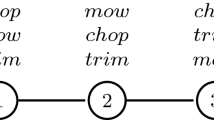Abstract
Although the Gap Procedure that Brams and Kilgour (2001) proposed for determining the price of each room in the housemates problem has many favorable properties, it also has one drawback: Its solution is not always envy-free. Described herein is an approach that uses linear programming to find an envy-free solution closest (in a certain sense) to the Gap solution when the latter is not envy-free. If negative prices are allowed, such a solution always exists. If not, it sometimes exists, in which case linear programming can find it by disallowing negative prices. Several examples are presented.
Similar content being viewed by others
References
Abdulkadiroğlu, Atila, Tayfun Sömez, and M. Utku Ünver. (2002). “Room Assignment — Rent Division: A Market Approach”. Typescript, Department of Economics, Columbia University, New York, NY, USA.
Brams, Steven J., and D. Marc Kilgour. (2001). “Competitive Fair Division,” Journal of Political Economy 109, 418-443.
Brams, Steven J., and Alan D. Taylor. (1996). Fair Division: From Cake-Cutting to Dispute Resolution. New York: Cambridge University Press.
Gould, F. J., G. D. Eppen, and C. P. Schmidt. (1993). Introductory Management Science, 4th ed. Englewood Cliffs, NJ: Prentice Hall.
Haake, Claus-Jochen, Matthias G. Raith, and Francis Edward Su. (2001). “Bidding for Envy-Freeness: A Procedural Approach to n-Player Fair-Division Problems”. Typescript, Institute of Mathematical Economics, University of Bielefeld, Bielefeld, Germany.
Klijn, Flip. (2000). “An Algorithm for Envy-Free Allocations in an Economy with Indivisible Objects and Money,” Social Choice and Welfare 17, 201-215.
Author information
Authors and Affiliations
Rights and permissions
About this article
Cite this article
Potthoff, R.F. Use of Linear Programming to Find an Envy-Free Solution Closest to the Brams–Kilgour Gap Solution for the Housemates Problem. Group Decision and Negotiation 11, 405–414 (2002). https://doi.org/10.1023/A:1020485018300
Issue Date:
DOI: https://doi.org/10.1023/A:1020485018300




